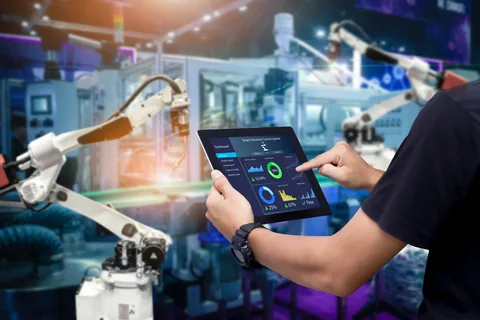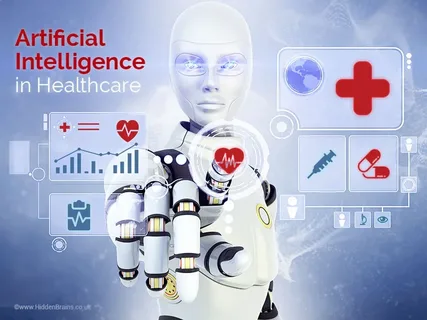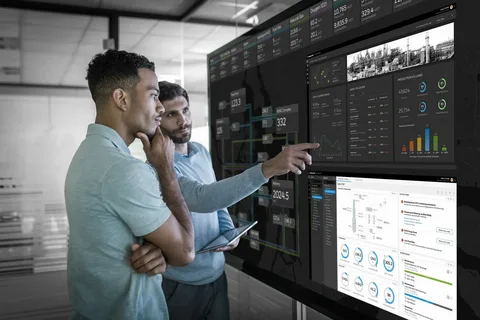
Artificial Intelligence (AI) has rapidly emerged as a transformative force, reshaping numerous industries across the globe. The pervasive influence of AI, often referred to as “open artificial intelligence,” is revolutionizing the way businesses operate and unlocking unprecedented opportunities for innovation and growth. From enhancing customer experiences to optimizing supply chains, AI is now at the forefront of driving change. In this brief exploration, we will delve into the profound impact of artificial intelligence, including notable examples of artificial intelligence applications, and examine how it is catalyzing a paradigm shift in various sectors.
Manufacturing Processes and Artificial Intelligence

In the field of manufacturing, artificial intelligence (AI) has emerged as a game-changer. With its ability to analyze and process vast amounts of data, AI has revolutionized various aspects of the manufacturing processes. One key area where AI has had a significant impact is in predictive maintenance. By employing AI algorithms, manufacturers are now able to anticipate and detect potential machinery malfunctions before they occur, thus minimizing downtime and optimizing productivity. For further information about how AI algorithms work check out this article. Additionally, AI-powered robots have also made their way onto factory floors, performing repetitive and labor-intensive tasks with unmatched precision and efficiency.
Another significant contribution of AI in manufacturing is in quality control. Traditional quality control methods relied heavily on manual inspection, which was time-consuming and prone to human error. However, with AI, manufacturers can now employ advanced computer vision techniques to detect defects in real-time, ensuring that only high-quality products make their way to the market. This not only enhances customer satisfaction but also leads to significant cost savings by reducing waste and rework. Moreover, AI has also facilitated the development of smart factories, where machines communicate with each other and make autonomous decisions to optimize the manufacturing process. This interconnectedness allows for better coordination, streamlined operations, and improved overall efficiency.
Enhancing Customer Experience through AI in Retail

In the ever-evolving landscape of retail, customer experience has taken on paramount importance. To meet the demands of increasingly tech-savvy consumers and stay ahead of the competition, retailers are turning to artificial intelligence (AI) solutions. AI is being used in various ways to enhance the customer experience in retail – from personalized product recommendations to virtual shopping assistants. By leveraging AI technology, retailers can better understand their customers’ preferences, make more targeted product recommendations, and ultimately deliver a more personalized and engaging shopping experience.
One way AI is enhancing customer experience in retail is through Chabot’s and virtual assistants. These intelligent AI-driven programs are designed to simulate human conversation and can provide customers with instant assistance. Whether it’s answering queries, helping with product searches, or providing recommendations, AI-powered Chabot’s are available 24/7 and can handle large volumes of customer interactions simultaneously. This not only reduces customer wait times but also ensures consistent and accurate responses. By integrating these virtual assistants into their websites or mobile apps, retailers can provide a seamless and efficient customer service experience, leading to increased customer satisfaction and loyalty.
Improving Healthcare with Artificial Intelligence

Artificial Intelligence (AI) is making significant strides in revolutionizing healthcare and improving patient outcomes. One area where AI is proving to be particularly impactful is in diagnostic and treatment accuracy. With the power to analyze vast amounts of patient data, AI algorithms can identify patterns and make informed predictions on potential diseases or conditions. This not only enhances the speed of diagnoses but also reduces the risk of misdiagnosis, ultimately ensuring patients receive the most appropriate and timely treatment.
Moreover, AI is streamlining administrative tasks and optimizing healthcare operations. By automating routine administrative processes such as scheduling appointments, managing electronic health records, and processing insurance claims, AI relieves healthcare professionals of time-consuming burdens, allowing them to focus more on delivering quality care to patients. Additionally, AI-powered algorithms can analyze data from various sources like wearable devices, patient monitoring systems, and EMRs, providing real-time insights that can help physicians make more informed decisions and design personalized treatment plans. As AI technology continues to advance, healthcare stakeholders can expect to witness an even greater transformation in the delivery of healthcare services.
Optimizing Supply Chain Management with AI Technology
The use of AI technology is revolutionizing supply chain management by streamlining processes and maximizing efficiencies. With AI-powered algorithms, businesses can accurately forecast demand, optimize inventory levels, and plan logistics routes to reduce costs and improve overall performance. By automating these tasks, companies can minimize human errors, speed up decision-making, and ensure the right products are delivered to the right place at the right time.
Furthermore, AI technology enables real-time monitoring and predictive analytics, allowing businesses to proactively identify and mitigate potential supply chain disruptions. Through data analysis, machines can detect patterns and anomalies that may impact operations, such as supplier delays, production bottlenecks, or changes in customer demand. By having this foresight, companies can take immediate action, preventing delays, minimizing risks, and maintaining a smooth supply chain flow. Overall, AI technology offers immense potential for optimizing supply chain management and driving operational excellence in today’s fast-paced business landscape.
Transforming Financial Services through Artificial Intelligence

With the rapid advancements in artificial intelligence (AI), the financial services industry is being propelled into a new era of transformation. Utilizing AI technology, financial services institutions are able to enhance their efficiency, accuracy, and security in various operations. One area that is experiencing significant change is customer service. AI-powered Chabot’s and virtual assistants are now being deployed by banks and other financial institutions to handle customer queries, provide personalized recommendations, and even assist with basic financial transactions. These AI assistants are available 24/7, ensuring that customers can access the support they need at any time, leading to improved overall customer experience. Additionally, AI algorithms are also being used to analyze customer data and identify patterns and trends, enabling financial institutions to offer tailored financial products and services that meet the unique needs of their customers.
Another major area where AI is transforming financial services is in risk management. AI algorithms can analyze vast amounts of data, including market trends, customer behavior, and historical patterns, allowing financial institutions to more accurately predict and manage potential risks. This enables them to make informed decisions about investments, loan approvals, and fraud detection. By leveraging AI, financial institutions can not only enhance their risk assessment capabilities but also reduce operational costs and bolster their overall performance. AI is revolutionizing the way financial services are conducted, leading to increased efficiency, improved customer experience, and better risk management practices.
AI-Powered Innovations in the Education Sector

Artificial intelligence (AI) has been making significant strides in the education sector, revolutionizing the way students learn and teachers teach. One of the key areas where AI is making a positive impact is personalized learning. With AI-powered tools and algorithms, educators can now tailor learning experiences to meet the unique needs and abilities of each student. This not only enhances student engagement but also helps to improve learning outcomes by adapting instructional strategies and content to individual learning styles.
Additionally, AI is enabling the automation of administrative tasks, such as grading and assessment. This frees up valuable time for educators, allowing them to focus on more important aspects of teaching, such as providing personalized feedback and building stronger relationships with their students. Moreover, AI-powered virtual tutors and Chabot’s are being used to provide assistance to students outside the classroom, offering personalized support and guidance anytime, anywhere. These virtual assistants can answer questions, provide explanations, and help students with their homework, ensuring that they have access to immediate help and resources when needed. Overall, AI-powered innovations in the education sector hold great promise in revolutionizing education and maximizing the potential of every learner.
Utilizing Artificial Intelligence for Smarter Energy Management

With the rapid advancement in AI technology, the energy sector is finding new ways to optimize energy management and increase efficiency. Harnessing AI for smarter energy management has become a top priority for many energy companies. AI-powered systems can analyze massive amounts of data in real-time and provide valuable insights to better understand energy consumption patterns. By leveraging machine learning algorithms, AI systems can identify energy-saving opportunities and suggest optimal energy usage strategies. This contributes to a more sustainable environment while also lowering energy expenses.
One of the key advantages of AI in energy management is its ability to predict energy demand accurately. By analyzing historical consumption data, weather patterns, and other relevant factors, AI systems can forecast future energy demand with a high level of accuracy. This allows energy companies to adjust their production and distribution processes accordingly, ensuring a steady supply of energy without any wastage. Moreover, AI-powered energy management systems can detect anomalies or potential issues in the energy infrastructure, enabling preventive maintenance and minimizing downtime. By continuously monitoring and optimizing energy usage, AI technology is revolutionizing the way we manage energy resources, making it more efficient, reliable, and sustainable.
AI in Transportation: Revolutionizing the Way We Travel

As the world becomes increasingly interconnected, transportation systems are faced with the challenge of providing efficient, safe, and sustainable modes of travel. Artificial intelligence (AI) is revolutionizing the way we travel by offering innovative solutions to enhance and optimize transportation networks. From self-driving vehicles to intelligent traffic management systems, AI is transforming the transportation industry, making travel more convenient, reliable, and eco-friendly. For detailed knowledge about Electric Vehicles and AI check out this amazing article here.
One of the key areas where AI is making significant strides is in autonomous vehicles. Self-driving cars powered by AI technology have the potential to revolutionize personal transportation by eliminating the need for human drivers. These vehicles are equipped with advanced sensors, cameras, and software algorithms that allow them to navigate roads, interpret traffic signs, and react to changing conditions. With AI, transportation can become safer and more efficient, reducing the likelihood of human error and accidents on the road. Moreover, autonomous vehicles can optimize fuel consumption, reduce congestion, and improve traffic flow, resulting in less environmental impact and better overall travel experiences.
Enhancing Cyber security with Artificial Intelligence

Cybersecurity is becoming a top priority for both individuals and businesses in the current digital era. With the rise of sophisticated cyber threats, traditional security measures are simply no longer sufficient to safeguard sensitive information. As a result, the integration of artificial intelligence (AI) in cyber security has emerged as a game-changing solution.
AI offers the potential to enhance cyber security by providing real-time threat detection and response capabilities. Through advanced machine learning algorithms, AI systems can continuously analyze massive amounts of data, identifying patterns, anomalies, and potential security breaches. This allows for proactive identification and mitigation of threats, significantly reducing response time and the potential impact of attacks. Additionally, AI can automate various security tasks, such as threat analysis and incident response, freeing up valuable human resources and improving overall efficiency in cyber security operations. Through the integration of AI, organizations can fortify their defenses and stay one step ahead of cybercriminals, ensuring the protection of critical data and systems. For detailed knowledge about Cyber Security and AI check out this amazing article HERE.
The Future of Artificial Intelligence: Opportunities and Challenges for Industries

Artificial Intelligence (AI) continues to advance at a rapid pace, presenting an abundance of opportunities for industries across the globe. From streamlining processes and automating tasks to better decision-making and improved productivity, AI offers endless possibilities for transformation. Industries such as manufacturing, retail, healthcare, finance, education, and transportation are already leveraging AI to revolutionize their operations, paving the way for enhanced efficiency and growth.
However, as these opportunities arise, challenges also come into play. One of the key concerns surrounding AI is the potential disruption of jobs. As more tasks become automated, there is a fear that human workers may be displaced. Simultaneously, there are issues related to ethical considerations, such as ensuring transparency, fairness, and accountability in AI systems. Privacy and data security concerns also remain significant hurdles to overcome, as the use of AI involves the collection and analysis of vast amounts of personal and sensitive information. While AI holds immense promise, addressing these challenges will be crucial to unlocking its full potential and reaping the benefits across various industries.
Final Thoughts:
Hence, in a world that’s constantly changing, artificial intelligence, or AI, is like a superstar, leading the way. It’s transforming industries in ways we never thought possible. From making our experiences better to helping businesses run smoother, AI is like a magic wand that’s changing the game. As we look ahead, the future is exciting. AI is the key that’s unlocking new doors and making the impossible, possible. So, get ready for a future where AI is the guiding star, leading us to uncharted territories of progress, with endless opportunities waiting for us to explore.
FAQ’S:
What is the impact of artificial intelligence on manufacturing processes?
Artificial intelligence is revolutionizing manufacturing processes by optimizing efficiency, increasing productivity, and improving quality control. It enables automation, predictive maintenance, and real-time monitoring, leading to cost savings and enhanced production capabilities.
How can AI enhance the customer experience in retail?
AI can personalize the customer experience in retail by analyzing data to understand customer preferences and behavior. It enables targeted marketing, personalized recommendations, virtual assistants, and Chabot’s, ensuring a seamless and tailored shopping experience.
How does artificial intelligence improve healthcare?
Artificial intelligence solutions in healthcare enhance diagnosis accuracy, enable personalized treatment plans, streamline administrative tasks, and improve patient monitoring. AI can analyze medical images, predict disease progression, and enable telemedicine, leading to better patient outcomes and cost savings.
What role does AI play in optimizing supply chain management?
AI technology optimizes supply chain management by analyzing vast amounts of data to improve demand forecasting, inventory management, and logistics planning. It enables efficient resource allocation, real-time tracking, and cost optimization, resulting in faster delivery and reduced operational costs.
How is artificial intelligence transforming financial services?
Artificial intelligence is transforming financial services by automating processes, detecting fraud, and providing personalized financial advice. AI-powered Chabot’s, virtual assistants, and robot-advisors improve customer service, reduce errors, and enhance decision-making capabilities.
What are the AI-powered innovations in the education sector?
AI innovations in the education sector include personalized learning platforms, intelligent tutoring systems, and automated grading systems. AI analyzes student data to provide tailored learning experiences, adaptive feedback, and personalized recommendations, enhancing student engagement and learning outcomes.
How can AI be harnessed for smarter energy management?
AI enables smarter energy management by analyzing consumption patterns, optimizing energy usage, and predicting demand fluctuations. It helps monitor and control energy systems, enhance energy efficiency, and integrate renewable energy sources, contributing to sustainability and cost savings.
How is AI revolutionizing transportation?
AI is revolutionizing transportation by enabling autonomous vehicles, optimizing route planning, and improving traffic management. It enhances safety, reduces congestion, and provides real-time information, transforming the way we travel and improving overall transportation efficiency.
How can AI enhance cyber security?
AI enhances cyber security by detecting and mitigating threats in real-time, analyzing patterns to identify anomalies, and enhancing data protection. AI-powered security systems can quickly respond to cyber-attacks, strengthen network defenses, and ensure data confidentiality and integrity.
What are the opportunities and challenges for industries in the future of artificial intelligence?
The future of artificial intelligence presents numerous opportunities for industries, including increased productivity, cost savings, enhanced customer experiences, and improved decision-making. However, challenges such as ethical considerations, data privacy, and the need for up skilling the workforce must be addressed to fully harness the potential of AI.














2 replies on “How Artificial Intelligence Is Now Changing Industries”
[…] large over our life like a strange shadow. Imagine this: while we wonder at AI’s capacity to revolutionize whole industries sectors and improve their operations, a terrifying truth becomes apparent. It’s a narrative […]
[…] Another industry that is undergoing a substantial transformation is retail. In the past, retailers relied on traditional market research methods to understand consumer behavior and make informed business decisions. However, with data science, they now have access to a wealth of customer data, such as purchasing habits, preferences, and even social media interactions. By analyzing this data, retailers can gain valuable insights into consumer trends and preferences, allowing them to personalize marketing campaigns, improve product offerings, and optimize supply chain management. Ultimately, this enhances the shopping experience for customers and increases profitability for businesses. Read full article here : https://technorious.com/how-artificial-intelligence-is-now-changing-industries […]